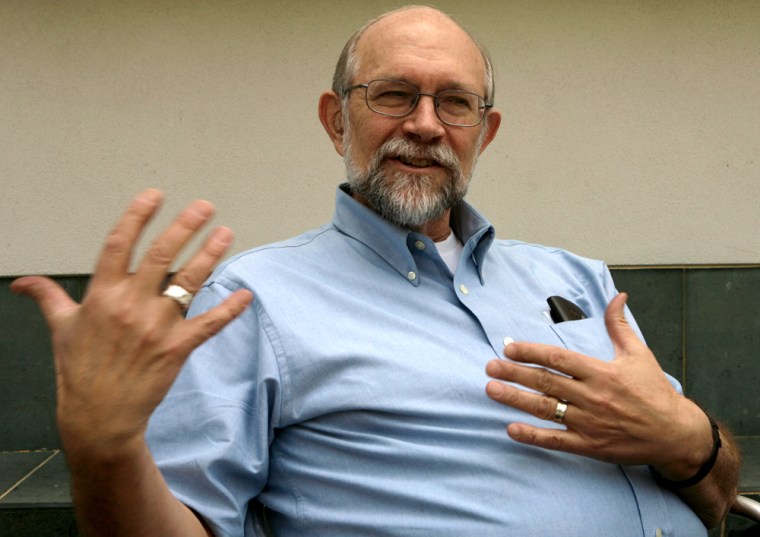Dennis V. Byrnes, a veteran engineer at NASA’s Jet Propulsion Laboratory, fired off a 1,300-word letter to his congressman in April complaining of “unwarranted intrusion” into his life.
Byrnes was disturbed by a new government requirement that workers at JPL and other NASA centers undergo background checks to get access to buildings and computers. “I have now been at JPL for nearly 30 years, have never been accused of a crime, nor have I committed any,” wrote the 64-year-old chief engineer of flight dynamics.
Byrnes is among some three dozen JPL workers who contacted Capitol Hill in recent months protesting the new security checks. Congress is taking notice, with several lawmakers complaining to Bush administration officials that the checks could violate people’s privacy and drive away talented employees.
Three years after the 2001 terrorist attacks, President Bush signed an executive order requiring government agencies to beef up security through a new badge system for millions of civil servants and contractors. The program includes the issuing of “smart cards,” ID badges with a photograph and fingerprints digitally embedded.
Federal workers and contractors must fill out a form online about their employment history, past residences and any illegal drug use. Those in more sensitive positions are asked to disclose financial records, list foreign trips and give the government permission to view their medical history. In both cases, workers must sign a waiver giving investigators access to virtually all personal information. Once the forms are processed, they submit their fingerprints to the FBI.
Losing or leaving jobs?
Employees from a cross-section of government — including the Education Department and the Bureau of Land Management — have spoken out. Several reported losing or leaving their jobs after refusing to undergo the background checks, though the exact number is not clear.
Some JPL workers argue such checks are unnecessary because the vast majority work on non-sensitive projects. They are also afraid their personal information will fall into the wrong hands and that the space agency will lose talented engineers.
Several aired their frustration to NASA Administrator Michael Griffin on Monday during an hour-long, all-hands meeting at the lab that was closed to the public and media.
Griffin apologized to those who found the new system intrusive but said that it was a “privilege to work within the federal system, not a right” and that he would carry out the order unless it was overturned in court, according to a video of the meeting obtained by The Associated Press.
Griffin said he had no qualms about giving up personal information. “I’m sorry if it sounds to you that I’ve surrendered to the dark side. I don’t see it that way,” he said.
University atmosphere
The Jet Propulsion Lab, in the foothills of the San Gabriel Mountains about 15 miles (24 kilometers) east of downtown Los Angeles, prides itself on its university atmosphere. Unlike other NASA centers, JPL, best known for its robotic explorations to Mars and other parts of the solar system, is run by the California Institute of Technology. JPL scientists, engineers and staff are Caltech employees.
Slideshow 12 photos
Month in Space: January 2014
But the 177-acre campus and its buildings belong to NASA. To enter the grounds, workers flash their ID badges at two checkpoints, and guards randomly search cars.
About 11,000 people with access to JPL will have to get the new smart cards by the end of October. A spokeswoman would not say how many have received them.
Besides scientists and engineers, the list of those who must fill out the forms and get fingerprinted includes janitors, bricklayers, plumbers, welders and visiting professors.
Although the government says that providing the information is voluntary, JPL says on its Web site “there are not any other options to secure your employment with JPL” for those who refuse.
Agencies obeying directive
The Office of Management and Budget, which is overseeing the new requirement, said all federal agencies are obeying the directive. The agency has held public forums to ease concerns about privacy, said Karen Evans, an OMB administrator.
“We’re working to make sure we have that public trust,” she said.
Byrnes said he is all for improving security but believes the background checks are draconian. He said he has not decided whether to defy the order when it is his turn.
“I agonize about it almost daily. I wake up in the middle of the night thinking about it,” he said.
Rep. Rush Holt, D-N.J., who serves on the House education and labor committee, has said the directive has done “great harm” and “fostered an environment of distrust and disregard for privacy.”
Contractors with NASA’s Goddard Space Flight Center in Maryland underwent a basic background check several years ago and recently have been asked to get a stricter clearance.
Kent McCullough, who studies the atmosphere and has been a NASA contractor for two decades, reluctantly filled out the online application. “I’m too young to retire,” he explained.

